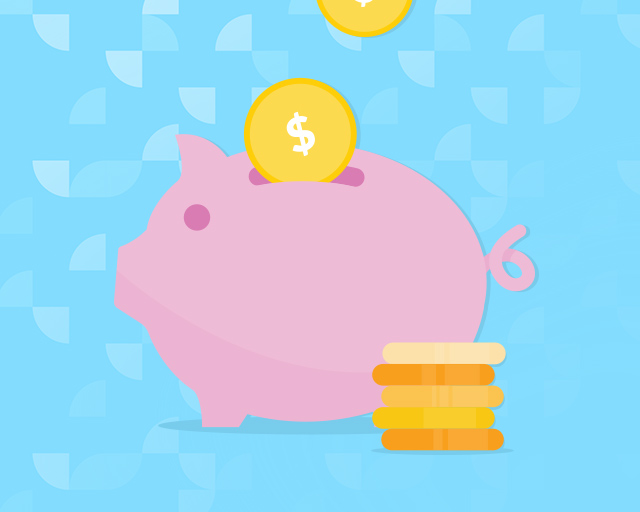

Welcoming a new pet, planning a wedding, having a baby, buying a home. These major life events can have a big impact on your finances but being financially prepared for them before they happen can help.
Bringing a new pet home is fun, but there’s more to it than giving it food and water and snuggles. Being financially prepared will help you enjoy becoming a pet parent even more. Now is a good time to reevaluate your budget, and see if and where a pet could fit in.
First, let’s talk about how much you would like to spend on a pet. Dogs, for instance, can cost hundreds to thousands of dollars, depending on where you get them from and the breed you choose. Shelter and rescue pets are generally less expensive than those found at breeders, but there can be some unknowns such as temperament or health problems.
Speaking of health, your next budget item is how much you may spend on veterinary bills each year. Initially, your pet may have to be spayed or neutered and potentially microchipped. Animals usually go in for annual checkups and those visits can add up. Researching different vet offices is important to compare pricing, as well as figure out the best fit for your pet.
It’s also important to work emergency vet visits into your budget, as sudden issues can happen. Some dog breeds are specifically known for their health problems and may require more vet visits. It’s worth looking into pet insurance. It won’t cover everything, but may help, and it may be offered through your employer.
Finally, consider the day-to-day care of an animal. It’s important to budget for how much you think you’ll spend on food and accessories, like a leash, a tank, cat litter or treats. If you’re sending your dog to day care, a boarding kennel, groomer or obedience classes, those factors should be considered, too.
Weddings can be expensive, but you don’t have to go for broke for your big day if you financially plan for it ahead of time.
A good place to start is to set up or keep contributing to a savings account specifically earmarked for wedding funds. This way, you keep it separate from your other accounts and you can see exactly how much is going in and out, making budgeting easier. If you can, try to have a longer engagement so you have more time to save, and try to pay for things in cash so you aren’t paying off credit cards after the wedding.
So, a budget. It’s helpful at the beginning stages of planning to sit down with your partner and talk about how much you want to spend, where you want to spend it, and keeping to your budget. To figure these things out, research, research, research. Price out the venue, music, flowers, catering, cake, dresses etc., to give you a more accurate picture of what will work with your budget. There are plenty of wedding planning and budget tools online, as well as ways to easily search for wedding vendors in your area that fit into your budget.
The word bargain doesn’t usually get associated with weddings, but it is possible to get deals on wedding-related things. Search online for wedding dress companies that may sell dresses for less than brick and mortar stores. Check to see if there are any wedding dress sample sales at local retailers to potentially pay less for a dress.
Dresses are usually marked down at the end of the wedding season in August, so if you’re able to have a long engagement or shop in the wedding off season, you may be able to score a great deal. You could also search for preowned wedding dresses and bridesmaid dresses in your area or online.
Believe it or not, you can find a bargain on flowers, too. Check out your grocery or big box store, work with a wholesaler in your area and arrange them yourself, or even use fake blooms.
A few more ways to save on your wedding could include getting married in the off season, such as late fall or winter, getting married on a Friday or a Sunday, and limiting the headcount to minimize costs.
Also, you want your big day to be perfect, but try not to dip into your emergency fund. Save that money for truly unexpected life events.
From doctor visits to diapers, babies are expensive. Before you welcome a new little one into the world, try to plan things out ahead of time.
You know what we’re going to say – create a baby budget for before and after the baby is born. The before budget could include what you’ll pay for health insurance, figuring out cost of prenatal care, labor and delivery, and postnatal care for both mom and baby, and checking if your employer pays for maternity/paternity leave. If they don’t, you should take some time to see how leave will impact your household budget.
For your post-delivery budget, you’ll need to include diapers, potential childcare, food, stroller, crib, car seat – everything baby will need in the future. It is possible to find used baby gear online, and that’ll save you a few bucks.
If you’re having a baby shower, wait to start buying gear until after to avoid duplicate items. You’ll also want to find a pediatrician in your insurance network.
Now would be a good time to check in on or start an emergency fund, aiming to have a few months’ expenses saved up, and set up a savings account for your baby. If you’re able, transfer some money into that savings account monthly or when you can for your baby’s future. It may also be helpful to look into creating or adjusting your will, to make sure your child is in good hands if the unexpected happens.
Are you at a place in your life where you want to buy a home? If so, you likely know that it’s not an inexpensive investment. So, where to start?
Think about how much house you’ll be able to afford. Create or go over your existing budget and see if there are areas you can adjust, and work saving for a house into it. Then, think about how quickly you want to achieve this goal and create a realistic timeline.
Next, go over your finances. Review your credit reports and credit scores and make sure they’re in the best shape possible. Since you’ll likely need to take out a mortgage, having your credit in decent shape will potentially help you secure a lower interest rate.
Good credit is a large part of what lenders are looking for but having a steady income and enough money for the down payment, closing costs, taxes and other expenses is important too. Lenders may also look at things like your recent tax returns, banking statements, and the loan amount you’d like compared to the value of the home.
While you’re applying for that mortgage, remember to keep paying bills on time so you continue to pay down debt. If your credit isn’t in the greatest shape, doing that may help improve it in the long run, which may also improve your chances of getting approved for a mortgage.
Start saving for your down payment as soon as you can. You may be able to put down as little as 3.5%, but if you’re able to put more money down, it may mean smaller mortgage payments and more choices in lenders.
Don’t dip into your emergency fund just to put more down on a house. You may need it in the future for unexpected home-related issues. Read more about saving for big purchases here.
When you have your finances in order, start researching your desired housing market. This may have changed when you thought about how much you’ll be able to afford. Think about aspects such as: will your investment rise in value over time, or what makes more sense, renting or buying? Read more about that here.
It may be helpful to reach out to a housing counselor, which may be low cost or free, depending on your personal situation. You may also be able to find a low cost or free first-time homebuying course, to help kick off the homebuying process.









